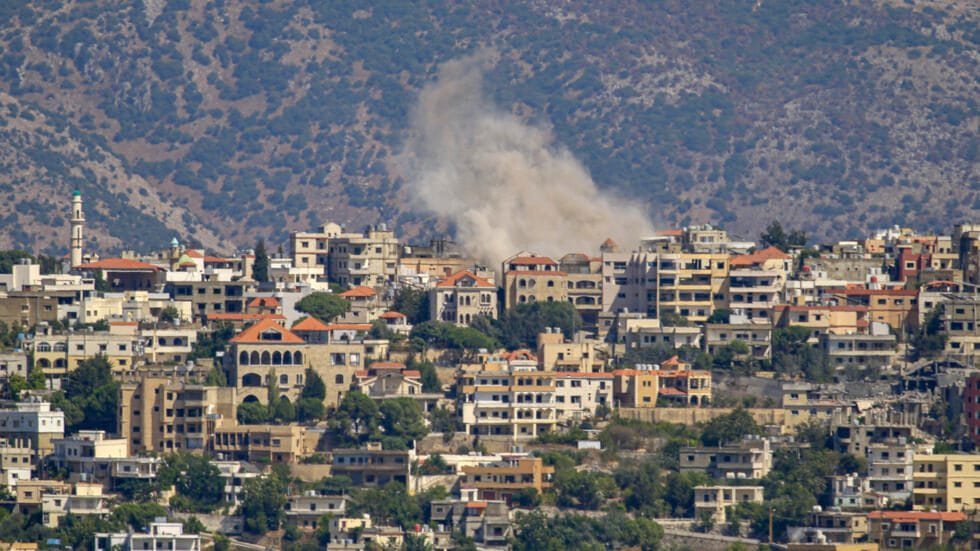لم تجد اللبنانية أسمهان شقير غرفة آمنة تؤوي عائلة زوجها النازحة من النبطية كفرمان في جنوب لبنان إلا بشق الأنفاس وببدل إيجار ناري.
وتروي أسمهان، المقيمة في قطر مع زوجها وابنتها، لـ«الشرق الأوسط»، المشقة التي عاشتها عائلة زوجها لإيجاد مسكن يؤويها بعدما نزحت يوم الاثنين الماضي مع تصاعد القصف الإسرائيلي على جنوب لبنان، والأسعار الخيالية التي تلقتها وكانت تصل إلى 3000 دولار في الشهر الواحد.
وبعد التصعيد العسكري الأخير استهدف القصف الإسرائيلي المنازل السكنية الآمنة وأسقط مئات القتلى وآلاف الجرحى، ما تسبب بأكبر موجة نزوح يشهدها لبنان من قرى وبلدات الجنوب منذ «حرب تموز» 2006، حيث بلغ عدد النازحين نصف مليون شخص، وفق ما أعلن وزير الخارجية اللبناني عبد الله بوحبيب، والغالبية العظمى منهم خرجت من المنازل من دون أن يكون لديها مكان تلجأ إليه.
وتقول أسمهان: «في الوقت الذي كان أهل زوجي عالقين في زحمة السير لنحو 16 ساعة وسط موجة النزوح الكبيرة الاثنين، كنا نحاول أن نجد لهم مكاناً ليذهبوا إليه… لم نكن نطلب منزلاً بلا مقابل، بل كنا نريد منزلاً نستأجره للعائلة المؤلفة من 6 أشخاص وطفلة عمرها شهر واحد».
وفي حين فعلت الدولة اللبنانية خطة الطوارئ لإيواء النازحين في المدارس وتقديم المساعدات اللازمة لهم، يبحث البعض عن مساكن في مناطق آمنة، ما يفتح الباب أمام بعض ملاك العقارات لاستغلال الظروف القاهرة ورفع أسعار الإيجارات بشكل كبير، كما فرض البعض شروطاً قاسية على المستأجرين، بما في ذلك دفع عدة أشهر سلفاً إضافة إلى التأمينات.
إيجارات بـ3000 دولار
وبحثت أسمهان وزوجها وأصدقاؤها المقيمون في لبنان في البداية عن منزل في الجبل، حيث تركز البحث في البداية في منطقتي عاليه وبيصور، وتضيف: «كانوا يطلبون نحو 2500 أو 3000 دولار بدل إيجار. بعض الذين كانوا يحاولون تسهيل الموضوع علينا كانوا يطلبون الدفعة بشكل شهري، أما البعض الآخر كان يطلب بدل إيجار لستة أشهر سلفاً إضافة إلى تأمين، ناهيك عن السماسرة الذين كانوا يطلبون مبلغ 500 أو 600 دولار إضافية».
أما في بشامون وعرمون فكانت الإيجارات بحدود الـ800 دولار، مع العلم أن الشقق نفسها كان ممكن تأجيرها بنحو الـ400 دولار قبل الاثنين، ومع ذلك لم تجد أسمهان شقة لعائلة زوجها؛ لأنها كانت كلها قد أجرت بالفعل.
وانتهى المطاف بالعائلة في شاليه في منطقة طبرجا، حيث استأجروا غرفتي نوم الواحدة منها بـ600 دولار، أي 1200 دولار شهرياً، وتؤكد أسمهان أن «السعر مرتفع بالنسبة لأشخاص مهجرين، خصوصاً أننا كنا بحاجة لبيت مفروش، في الشاليه لا يستطيعون تحضير الطعام أو غسل الملابس، فهو عبارة عن غرفة نوم فقط».
«صاحب الملك سلطان»
وفي هذا الإطار، يوضح رئيس نقابة الوسطاء والاستشاريين العقاريين وليد موسى لـ«الشرق الأوسط»، أن «صاحب الملك سلطان ولا أحد يستطيع بالقانون أن يملي عليه ماذا يفعل بملكه»، مشيراً إلى أنه لا توجد أي سلطة من الدولة لوضع حد لأسعار الإيجارات.
ورغم أن وسائل التواصل الاجتماعي تضج بالحديث عن ارتفاع أسعار الإيجارات بعد قصف يوم الاثنين، يقول موسى: «إلى اليوم لم نر ارتفاعاً في أسعار الإيجارات مثلما حصل في الصيف، وربما الارتفاع في بعض المناطق، لكن الأمور تتطور بشكل سريع جداً، وكمية الناس التي تطلب شقق للإيجار مخيفة».
وشهد لبنان ارتفاعاً جنونياً في أسعار الإيجارات خلال الصيف، مع توافد المغتربين إلى لبنان، إضافة إلى ارتفاع حدة المناوشات في الجنوب والاستهدافات في الضاحية الجنوبية، ما زاد الطلب على المساكن في الأماكن الآمنة، إلا أن ارتفاع الأسعار عاد لينخفض مع دخول شهر سبتمبر (أيلول).
وإذ يؤكد أن هناك عشوائية وفوضوية في أسعار الإيجارات، يشرح أن «الموضوع يخضع للعرض والطلب، واليوم الطلب أكثر بكثير من العرض».
ويضيف: «لا أحد يستطيع الحد من ارتفاع الأسعار، ولا نستطيع أن نحدد طريقة الدفع إن كانت بالسلف أو شهرية؛ فهذا يحدده المالك مع المستأجر، وعلى المستأجر أن يرضخ لشروط المؤجر وهذا القانون».
أما عن الحلول، فيقترح موسى للمرحلة المقبلة أن يكون هناك تشريع للظروف الاستثنائية والحروب والكوارث، حيث يفرض على المالك تأجير العقار على سعر آخر مبلغ سند إيجار مسجل لدى البلدية، مشيراً إلى أن هذا الأمر يحتاج لتشريع.
«لنفيد ونستفيد»
ويواجه العديد من النازحين الأزمة نفسها، حيث يجدون مساكن ببدل إيجارات مرتفعة جداً، يحاول بعض الملاك الاستفادة والإفادة في آن واحد.
ويخبر أمجد، وهو اسم مستعار، «الشرق الأوسط»، بأنه انتقل مع زوجته من منزله الكائن في منطقة مار إلياس في العاصمة بيروت للإقامة مع أهله، وأجر منزله لعائلة نازحة بسعر «جد مقبول»، على حد وصفه.
ويقول: «طلبت 800 دولار بدل إيجار في الشهر، خصوصاً أن الشقة مساحتها 150 متراً وهي مفروشة ومجهزة بالكامل… فهذا المنزل الذي أسكن فيه مع عائلتي».
وعن السبب الذي دفعه إلى القيام بهذه الخطوة، يوضح أمجد أنه أراد الاستفادة مادياً من ناحية، ومن ناحية أخرى أراد أن يساعد العائلات النازحة، ويضيف: «كلمني صديق لي من سكان النبطية وكان لا يعلم أين يذهب مع عائلته، فقدمت له منزلي بإيجار لا يستنزفه ويساعدني مادياً».
أما عن المدة التي سيبقى فيها المستأجر، وعما إذا كان أمجد سيسمح ببقائه في حال طالت الحرب على الجنوب، يجيب بأنه لا يعتقد أن الأمر سيطول لأكثر من شهر أو شهرين، لكن إذا طال سيكون عليه أن يبحث عن منزل آخر.
«من هدفه المساعدة لا يستغل الناس»
لكن بالمقابل، يفتح العديد من المالكين بيوتهم مجاناً لإيواء النازحين، فاللبنانية منى لم تتردد للحظة في فتح منزل والدتها المسافرة في عبرا لاستقبال عائلة نازحة من منطقة الغازية.
وتحكي منى وهي متزوجة لـ«الشرق الأوسط»، أنها كانت تجري اتصالات يوم الاثنين لكل معارفها الذين يسكنون في مناطق خطرة في الجنوب للاطمئنان عليهم، وكانت تكرر للجميع: «منازلنا مفتوحة لكم في أي لحظة».
وتقول: «الناس خرجوا من منازلهم ولم يكونوا يعرفون إلى أين يذهبون، فطلبت مني صديقة في آخر لحظة أن تبقى في منزل والدتي ليوم واحد لتكون قد أمنت وعائلتها مسكناً، لكني أصررت أن يبقوا».
وتؤكد منى أن «كل ما نستطيع أن نقدمه الآن هو مساعدة النازحين وهذا أقل واجب»، مشددة على أن «الهدف ليس الاستفادة، بل تأمين مأوى للنازحين، حتى لو اضطر الأمر لنفتح بيوتنا. من هدفه المساعدة يجب ألا يستغل الناس».
المصدرك لينا صالح – الشرق الأوسط
Lebanese Displaced People Pay a Heavy Price for Safety… with Rent in the Thousands of Dollars
Lebanese Asemhan Shakir could only find a room to safely accommodate her husband’s family displaced from Nabatiyeh Kfarman in southern Lebanon with great difficulty and at an exorbitant rent.
Asemhan, who lives in Qatar with her husband and daughter, recounts to Asharq Al-Awsat the hardships her husband’s family faced in finding a home after fleeing last Monday amid escalating Israeli bombardment on southern Lebanon, with rental prices soaring to $3,000 a month.
Following the recent military escalation, Israeli bombardment targeted safe residential homes, resulting in hundreds of deaths and thousands of injuries, causing the largest wave of displacement Lebanon has witnessed from southern villages and towns since the 2006 “July War.” According to Lebanese Foreign Minister Abdullah Bou Habib, the number of displaced people reached half a million, with the vast majority having left their homes without knowing where to go.
Asemhan says, “At the time when my husband’s family was stuck in traffic for about 16 hours amid the large wave of displacement on Monday, we were trying to find them a place to go… We weren't asking for a free house, but we wanted a house to rent for a family of six and a one-month-old baby.”
While the Lebanese state activated its emergency plan to shelter the displaced in schools and provide necessary assistance, some people are looking for housing in safe areas, opening the door for some property owners to exploit the dire circumstances and raise rental prices significantly. Some landlords imposed harsh conditions on tenants, including paying several months' rent in advance plus security deposits.
Rents of $3,000
Asemhan and her husband, along with their friends residing in Lebanon, initially looked for a home in the mountains, focusing their search in the regions of Aley and Bissar. She adds, “They were asking for about $2,500 or $3,000 in rent. Some who were trying to help us asked for payment on a monthly basis, while others requested six months’ rent in advance, in addition to deposits, not to mention brokers who were demanding an extra $500 or $600.”
In Bashamoun and Aramoun, rents were around $800, knowing that the same apartments could have been rented for about $400 before Monday, yet Asemhan could not find an apartment for her husband's family because they were all already rented.
The family ended up in a chalet in the Tabarja area, where they rented two bedrooms at $600 each, totaling $1,200 a month. Asemhan confirms that “the price is high for displaced individuals, especially since we needed a furnished house. In the chalet, they can't prepare food or wash clothes; it is merely a bedroom.”
“Landlords are Kings”
In this context, the president of the Real Estate Brokers and Consultants Syndicate, Walid Moussa, explains to Asharq Al-Awsat that “the landlord is the king, and no one can legally dictate what he should do with his property,” noting that there is no governmental authority to limit rental prices.
While social media is buzzing with discussions about rising rental prices following Monday's bombardment, Moussa says, “So far, we haven't seen an increase in rental prices as we did in the summer, and perhaps there is an increase in certain areas, but things are evolving very quickly, and the number of people looking for rental apartments is alarming.”
Lebanon witnessed a skyrocketing increase in rental prices during the summer due to the influx of expatriates, along with heightened tensions in the south and attacks in the southern suburbs, which increased demand for housing in safe areas. However, rental prices began to decline again with the arrival of September.
While he confirms that there is randomness and chaos in rental prices, he explains that “the situation is subject to supply and demand, and today the demand is much higher than the supply.”
He adds, “No one can curb price increases, and we cannot dictate the method of payment, whether it be in advance or monthly; this is determined by the landlord and tenant, and the tenant must comply with the landlord's terms, and that is the law.”
As for solutions, Moussa suggests that there should be legislation for exceptional circumstances, wars, and disasters, requiring landlords to rent their properties at a different price based on the last registered lease amount at the municipality, noting that this requires legal enactment.
“To Benefit and Help”
Many displaced individuals face the same crisis, finding homes with exorbitant rents, as some landlords seek to exploit the situation for mutual benefit.
Amjad, a pseudonym, tells Asharq Al-Awsat that he and his wife moved from their home in the Mar Elias area of Beirut to live with his family and rented out their apartment to a displaced family at a “very reasonable” price.
He says, “I asked for $800 in monthly rent, especially since the apartment is 150 square meters and fully furnished and equipped… this is the house I live in with my family.”
Regarding the reason behind his decision, Amjad clarifies that he wanted to benefit financially while also helping displaced families. He adds, “A friend of mine from Nabatiyeh called me, not knowing where to go with his family, so I offered my apartment for rent at a price that wouldn't strain him and would help me financially.”
As for the duration the tenant would stay, and whether Amjad would allow them to remain if the war in the south prolonged, he responds that he doesn't believe it will last more than a month or two, but if it does, he will have to look for another home.
“Those Who Aim to Help Do Not Exploit People”
However, many landlords are opening their homes for free to shelter the displaced. Lebanese Mona did not hesitate for a moment to open her mother’s home in Abra, who is currently traveling, to host a displaced family from the Ghazieh area.
Mona, who is married, tells Asharq Al-Awsat that she was making calls on Monday to all her acquaintances living in dangerous southern areas to check on them, repeatedly saying to everyone: “Our homes are open to you at any moment.”
She says, “People left their homes not knowing where to go, so a friend asked me at the last minute if she could stay in my mother’s house for a day to ensure safety for her and her family, but I insisted that they stay.”
Mona emphasizes that “the least we can do now is help the displaced, and this is the least duty we can fulfill,” stressing that “the goal is not to benefit but to provide shelter for the displaced, even if it means opening our homes. Those who aim to help should not exploit people.”
translated by economyscopes team
 سكوبات عالمية إقتصادية – EconomyScopes إجعل موقعنا خيارك ومصدرك الأنسب للأخبار الإقتصادية المحلية والعربية والعالمية على أنواعها بالإضافة الى نشر مجموعة لا بأس بها من فرص العمل في لبنان والشرق الأوسط والعالم
سكوبات عالمية إقتصادية – EconomyScopes إجعل موقعنا خيارك ومصدرك الأنسب للأخبار الإقتصادية المحلية والعربية والعالمية على أنواعها بالإضافة الى نشر مجموعة لا بأس بها من فرص العمل في لبنان والشرق الأوسط والعالم




